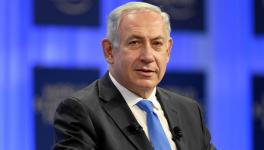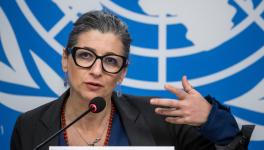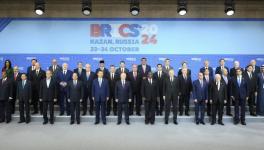With Eye on Iran, Netanyahu Wades into Ukraine War
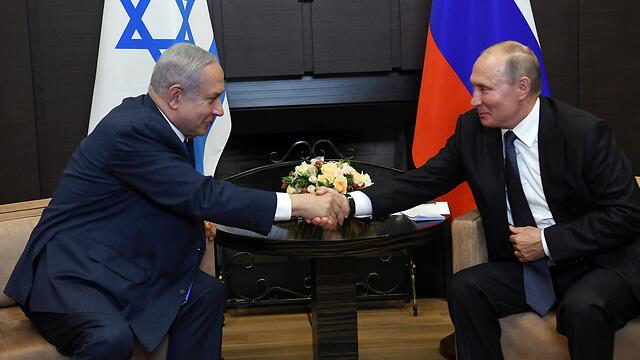
Russian President Vladimir Putin (R) with Israeli Prime Minister Benjamin Netanyahu at a meeting in Sochi (File photo)
In his second coming as Israel’s Prime Minister, Benjamin Netanyahu has hit the ground running. The international climate in which he skilfully operated for close to 15 years in two stints as prime minister has changed beyond recognition.
Netanyahu’s foreign policy legacy has become listless — principally, the Abraham Accords and Israel’s hugely consequential relationship with Russia, both of which significantly impacted the tough neighbourhood in which he successfully navigated Israel’s core interests.
For sure, breathing new life into the above two vectors — Abraham Accords (Israel- Saudi ties) and Israel’s relations with Russia — will remain top priorities for Netanyahu. While Israel-Saudi relations impact regional security, Israel’s relations with Russia will have far-reaching consequences for Israel’s security. That is for three reasons.
First, Putin is at war with the US and the Western world who are Israel’s traditional allies. But Netanyahu is anything but a one-dimensional man. Trust him to turn challenges into new opportunities.
Second, recapturing the verve in the relationship with Moscow has a great deal of collateral significance. Russia has become a full-fledged West Asian actor today and, arguably, in certain ways makes a more effective regional partner for Israel than the US. The US’ retrenchment is plain to see and the ensuing decline of its capacity to leverage allies such as Saudi Arabia, the UAE or Egypt hits Israeli interests.
Third, during these 18 months that Netanyahu was out of office, Russia and Iran have turned around their difficult relationship into a quasi-alliance, thanks to western sanctions against Moscow. Netanyahu senses the folly of the West trying to “erase” Russia.
The media is discussing a possible deal between Moscow and Tehran over Russia’s Su-35 Super Flanker multi-role 4+ generation fighter jets. What lends an intriguing touch is that the deepening military ties between them coincide with Tehran’s intention to expand its uranium enrichment program. Iran reportedly reached 60% enrichment of uranium at its Fordow enrichment plant and has reportedly informed the IAEA that it had started to enrich uranium at the higher levels.
Then, there is the Syrian sub-plot where Israel continues to operate in that country’s air space, which Russia controls, largely due to the secret understanding between Netanyahu and Putin whereby Moscow acquiesced with Israeli activities to contain Iran and its militia groups and squash its attempt to turn Syria into yet another “resistance front” like Lebanon or Gaza.
However, it is the Ukraine war that has dramatically uplifted Russia-Iran strategic ties. Netanyahu realises that the fledgling Russo-Iranian quasi-alliance can be tackled if the Russian dependency on Iranian military technology is rolled back.
That ultimately requires that the Ukraine war should be brought to an end sooner rather than later and also an easing of western sanctions. Most certainly, the war should not be allowed to run its current indeterminate course. This is precisely where Netanyahu can be expected to concentrate his formidable diplomatic skill.
The signs are there already. Soon after taking over as the new foreign minister in Netanyahu’s cabinet, on Monday, Eli Cohen stated that he was planning to have a conversation with his Russian counterpart Sergey Lavrov on January 3.
The manner in which way Cohen framed this disarmingly simple proposition during his inaugural speech (which was broadcast live by Israeli Foreign Ministry’s press service) needs to be carefully noted: “Tomorrow, I am supposed to talk with Russian Foreign Minister Sergey Lavrov and later on with other European ministers.”
Earlier, in a recent speech, Cohen hinted that on the issue of Russia and Ukraine, Netanyahu government will be discreet in its public utterances, pointing toward a major course correction toward engaging Russia. The outgoing Israeli PM Yair Lapid had condemned Russia publicly. Since the Russian operation in Ukraine began on February 24, Lapid as FM never once spoke with Lavrov — or with Putin, while officiating as interim PM.
However, even under Lapid, Israel’s pro-Kiev policies did not go far beyond rhetoric. The Israeli ambassador to Kiev, Michael Brodsky told Washington Post recently that Israel’s relations with Russia are creating “limits that cannot be overcome.” Brodsky added that Israel is aware of the “frustration of some Ukrainian Jews,” but “no government in Israel is going to jeopardise this interest [with Russia] for anybody else, including the Ukrainians.” Brodsky also noted that Israel’s situation is “fragile,” as it is not part of NATO, and most Ukrainian Jews understand that Israel is in a “tough position.”
For Israel, Russia is not like any country. Russian-speakers constitute 15% of Israel’s population. It is an influential constituency in Israeli domestic politics and has kinship with the Jewish population in Russia. Russian investment in Israel is rather substantial and it is an open secret that Russia’s oligarchs viewed Israel as a home away from home.
Truly, the umbilical cord that ties Russian culture and history with Jerusalem cannot easily be ruptured. Only last week, Moscow reiterated its demand to reclaim Russian assets in Israel. Former prime minister Sergei Stepashin, who handles the issue, announced in Moscow that Russia will submit a claim to Israeli court for the Church of Mary Magdalene, Chapel of the Ascension, and the Viri Galilaei Church!
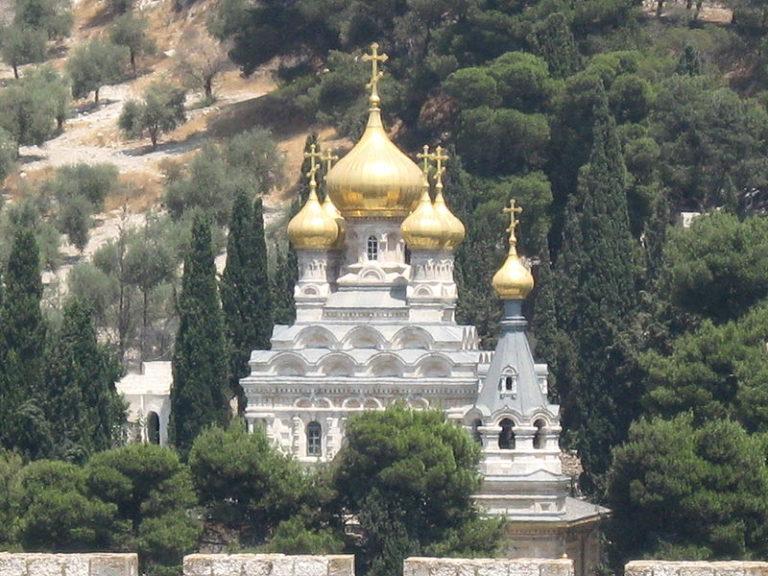
Church of Mary Magdalene, Orthodox Christian Church on Mount of Olives across the Temple Mount in Jerusalem built in 1888 by Tsar Alexander III and his brothers to honour their mother.
Putin has also demanded an end to the litigation preventing the transfer of Alexander Nevsky Church in the Old City, after commitments made by Benjamin Netanyahu during a previous term as prime minister. Conceivably, such demands are part of internal Russian politics as well.
The Kremlin feels elated that Netanyahu is back in the diplomatic circuit. What is most gratifying will be that unlike the previous Israeli set-up, Netanyahu will not passively accept a subaltern role in the US-Israeli partnership.
Netanyahu has extensive networking with American elites and he won’t hesitate to leverage it if Israeli interests are at stake. And, without doubt, Israel is a stakeholder in the Ukraine crisis and Israeli interests are well served by creating space for peace talks to commence between Moscow and Kiev.
Netanyahu has Putin’s ears and can play a role for the Biden Administration, too, like no other western leader can perform today. On the other hand, Iran’s nuclear programme is turning into a fuming volcano and a point may come very soon when Netanyahu will be compelled to act. And that could happen in the 2024 election year, something that the Biden Administration can ill-afford to see happening. Suffice it to say, the Ukraine conflict and Iran’s bomb are joined at the hips, as it were.
Putin said in a message to Netanyahu on Thursday, “In Russia, we greatly appreciate your personal and longstanding contribution to strengthening friendly relations between our countries.” Russia’s foreign ministry said it was “ready for constructive cooperation” with Israel to “clear up the climate in the Middle East and the international scene in general”.
On December 22, Putin called Netanyahu to congratulate him on his election victory and the establishment of a new government, while Netanyahu’s office disclosed in a statement that the conversation mainly revolved around the conflict in Ukraine. Netanyahu told Putin he hopes a resolution to end hostilities will be found as soon as possible, and the consequent suffering.
Netanyahu also told Putin that he is determined to prevent Iran from obtaining nuclear weapons and curb Tehran’s attempts to establish military presence in Lebanon and Syria along Israel’s northern border.
To be sure, Putin is all ears and eyes for Netanyahu. The point is, Moscow gains if diplomacy reappears on the wasteland of Ukraine issue. Certainly, it is far from the case that Russia is enjoying the destruction of Ukraine or the sorrows of the fraternal people.
MK Bhadrakumar is a former diplomat. He was India’s ambassador to Uzbekistan and Turkey. The views are personal.
Get the latest reports & analysis with people's perspective on Protests, movements & deep analytical videos, discussions of the current affairs in your Telegram app. Subscribe to NewsClick's Telegram channel & get Real-Time updates on stories, as they get published on our website.











